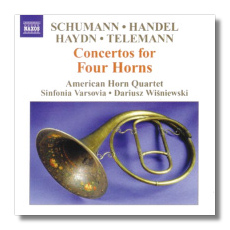
The Internet's Premier Classical Music Source
Related Links
- Latest Reviews
- More Reviews
-
By Composer
-
Collections
DVD & Blu-ray
Books
Concert Reviews
Articles/Interviews
Software
Audio
Search Amazon
Recommended Links
Site News
 CD Review
CD Review
Concertos for Four Horns

- Robert Schumann: Konzertstück for Four Horns, Op. 86
- George Frideric Handel: Concerto in F Major
- Georg Philipp Telemann: Overture in F Major
- Franz Joseph Haydn: Symphony #31 in D "Horn Signal"
American Horn Quartet
Sinfonia Varsovia/Dariusz Wišniewski
Naxos 8.557747 DDD 75:40
If one horn is good, then why not four? This is a collection of "Concertos for Four Horns," and it's true that the Schumann is a concerto in everything but name. Haydn's symphony is, well, a symphony, and Telemann's Overture is really a suite in nine movements. As for Handel's Concerto, it's unclear to which genre it belongs, and it doesn't matter anyway. Better far, and easier, simply to enjoy the music on this CD.
Schumann's Konzertstück is more popular than ever, thanks to the fine educations young horn players receive in conservatories all over the world, and thanks also to refinements in the instrument, even since Schumann's time. The work's ebullient and masculine opening immediately suggests the outdoors – a natural habitat for the horn – but there also is time to be mellow and tender in the central Romanze. The opening theme of Handel's Concerto sounds suspiciously like the opening of the Royal Fireworks Music, which was composed a few years later. The composer says what he needs to say in a little more than six minutes, which is plenty of time to evoke the pageantry of a royal occasion. Telemann's Overture was written about a quarter-century earlier. This is one of those confections that Telemann wrote so ably, full of wry humor and excellent musicality. Telemann's penchant for descriptive music is exercised here, with movement titles such as "The Bells of Hamburg" and "The Concert of the Frogs and Crows." Finally, Haydn's "Horn Signal" Symphony comes from 1765, early in the composer's years at Esterháza. This is a standard symphony in four movements, albeit one of the most distinctive among the earlier symphonies. As in the Handel and the Telemann, the horns play a prominent role, but they are not the centers of attention. Haydn's reason for writing a symphony with four prominent horn parts probably had something to do with the fact that the Esterházy orchestra of that era included four excellent horn players, including Franz Stamitz.
The members of the American Horn Quartet (Kerry Turner, Charles Putnam, David Johnson, and Geoffrey Winter) have been playing together since 1982, and they make playing this famously recalcitrant instrument sound easy… easy, that is, without removing that delicious feeling of risk. This program is fine showcase for their talents, individually and together. The Sinfonia Varsovia is an expansion of the Polish Chamber Orchestra dating from 1984. On this CD, anyway, their playing is stylish. Modern instruments are used, but in a manner sympathetic to music-making during the 19th and 18th centuries. When an ensemble like the Chicago Symphony Orchestra (for example) plays the Schumann Konzertstück, they really rip into. These Polish musicians are more modest, and frankly, more charming. There's particularly adorable solo work in the Haydn. The engineering is good. I do wish, however, that Naxos had said more about the music.
Copyright © 2006, Gerald Fenech




















